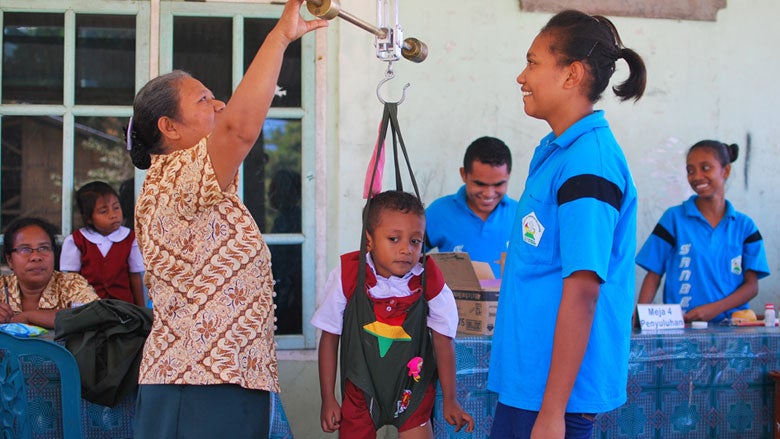
To get a full picture of how social accountability can improve the quality of health services in Indonesia, one only has to travel to the border areas in East Nusa Tenggara (NTT) province.
On a scorching afternoon in August 2015 in Bijaepasu sub-district, a six hour drive from the provincial capital Kupang, a queue was forming in front of the village health center or puskesmas. The crowd seemed undeterred by the temperature that hovered around 40 degrees Celcius.
Leaning against its deteriorating walls were mothers and babies, elderly women and men. The queue was long and slow moving. The health center workers appeared overwhelmed. There were barely any medical equipment or supplies.
Some of the mothers had to travel for hours by foot in the hopes of receiving treatment here. When asked about their rights to health services – and the minimum standard of adequate service – virtually everyone expressed no knowledge.
Similar scenes are seen across more remote parts of Indonesia, reflecting an important challenge for the country: the lack of access to quality health services. Strengthening social accountability, or community engagement, is an important element to improve these services. It is key to helping policy makers draft policies that serve the needs of the citizens. Getting citizens to participate in making decisions to improve the lives of millions of poor and vulnerable in Indonesia is essential. Social accountability can help Indonesia reduce its high mortality rate, decrease incidence of stunting among Indonesian children, and help alleviate the hardship of the country’s 28 million poor.
But many health centers and villages such as those in Bijaepasu sub-district lack the foundations of participation by communities. There are no procedures for communities to express their concerns, grievances and expectations. Local forums connecting communities with systems to assess the quality of health services, such as score cards, are missing. The absence of these makes social accountability nonexistent in the village.
With support from the World Bank, the National Development Planning Agency (BAPPENAS) and local NGO Wahana Visi Indonesia recently held a seminar to discuss the role of social accountability in improving healthcare services.
One important supporter of social accountability is the Minister of National Development Planning, Sofyan Djalil. Social accountability can be a way for communities to incorporate local knowledge in healthcare services, said Minister Djalil.
“I grew up in a village and I saw first-hand how issues were resolved through local wisdom,” Djalil said in his speech. He also said that it must provide a balance between demands from the communities with ‘supply’ from the health providers.
Participants at the seminar also shared some best practices from the field. Antonius Luju, head of Nita village in NTT province, said that his communities are now more aware about their rights as patients and demand, at the very least, a minimum standard for health services. Villagers have also called for increased transparency and accountability. In response, Luju put up a big banner outlining the villages’ budget allocation for healthcare.
Carolus, who runs Nita’s puskesmas, said that at first he was worried about the complaints from the community. But he gradually welcomed the dialogue and used the feedback from his community to advocate for improved services at the puskesmas. In response, he made sure that there is at least one nurse in every village.
Some villagers report that not only have they received more appropriate equipment in the clinics, but health providers have also become more responsive. Communities can be confident that service quality has, and will, improve.
Nita village is one of the locations served by a project supported by the World Bank’s Global Partnership for Social Accountability. It was established in 2012, working to enhance “citizens’ voice” and support the ability of governments to respond effectively to this voice. Wahana Visi Indonesia has been the main implementing partner for the program in Indonesia, particularly in NTT province. Since 2014, the NGO has been leading the Citizen Voice and Action Program, focusing on health services for mothers and infants in Nita village, along with 60 other villages throughout the province.
It is encouraging to see increased community participation in parts of this remote province, because NTT lags behind other provinces in many development indicators. More than half of its children aged five and below are stunted, and more than 20% of the province’s population live below the national poverty line. The province also has a very dry climate, with a very short rainy season, making it vulnerable to socio-economic shocks such as failed crops.
In the coming months, our team in Jakarta will work with development partners to complete the Policy Brief on Social Accountability in Health Services in Indonesia. We hope that our analysis will help guide dialogue among Indonesian policy makers to strengthen social accountability in health services delivery.
The path towards better social accountability is long, but Indonesia’s journey has begun.



Join the Conversation